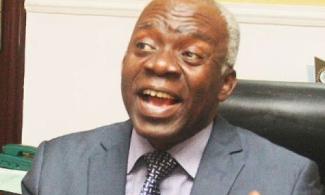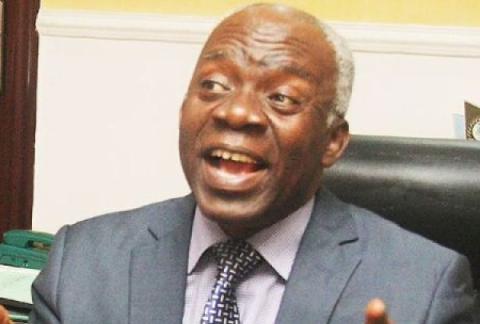
Human rights lawyer, Femi Falana (SAN) has said no police permit is required for the conduct of public protests by the citizenry, except for the governor's permit.
Human rights lawyer, Femi Falana (SAN) has said no police permit is required for the conduct of public protests by the citizenry, except for the governor's permit.
Falana made the assertion amid threats by the police and other security agencies to disrupt the planned events to commemorate last year’s October 20 #EndSARS protests.

The Lagos State Police Command had said it would not tolerate any public gathering to commemorate the first anniversary of the #EndSARS protests.
Nigerians had, in October 2020, protested against the now-disbanded Special Anti-Robbery Squad (SARS), a lawless unit of the Nigeria Police Force.
The protest, tagged #EndSARS, was later hijacked by hoodlums, leading to killings and destruction of public buildings.
SaharaReporters had reported that there was a growing momentum towards Wednesday’s memorial #EndSARS protests nationwide to honour the victims of police killings and demand good governance.
Falana, in a statement obtained by SaharaReporters on Tuesday, said, “The defunct All Nigeria Peoples Party applied to the Nigeria Police Force to hold rallies protest the alleged rigging of the 2003 general elections.
“The application was turned down by the Police Authorities. Convinced that the action of the Police could not be justified, the ANPP proceeded with the plan to hold the rallies. The first in the series of the rallies which held in Kano on September 22, 2003, was attended by the leaders of the party, including General Muhammadu Buhari (as he then was).
“Even though the rally was peaceful, it was violently disrupted by the police. To put an end to such crude violation of the freedom of citizens to convene rallies without official harassment, the ANPP and 10 other political parties instructed our law firm to challenge the disruption of the Kano rally.
“We accepted the brief and filed the suit at the Federal High Court to challenge the constitutional validity of police permit as a precondition for exercising the freedom of expression and freedom of assembly guaranteed by sections 39 and 40 of the Constitution and articles 10 and 11 of the African Charter on Human and Peoples Rights Act. In defending the action, the defendant contended that by failing to obtain police permit the conveners of the rally had violated the provisions of the Public Order Act.
“In the epochal judgment of the Court in the case of All Nigeria Peoples Party v Inspector-General of Police the trial judge, the Honourable Justice Chinyere stated inter alia: ‘The gist of the provision in section 1 of the Act is that the Governor of each State is empowered to direct the conduct of all assemblies, meetings and processions on public roads or places of public resort in the state and prescribe the route by which and times at which the procession may pass.
“’Persons desirous of convening or collecting any assembly or meeting or of forming a procession in any public resort must apply and obtain the license of the Governor.
“The Governor can delegate his powers to the Commissioner of Police of the State or to other police officers. Persons aggrieved by the decision of the Commissioner of Police may appeal to the Governor and the decision of the Governor shall be final and no further appeal shall lie therefrom'.
“In upholding the fundamental rights of Nigerians to freedom of expression and assembly enshrined in sections 39 and 40 of the Constitution and Articles 10 and 11 of the African Charter on Human and Peoples’ Rights Act (Cap A9) Laws of the Federation of Nigeria, 2004, the learned trial judge said: ‘In my view, the provision in section 40 of the Constitution is clear, direct and unambiguous.
“’It is formulated and designed to confer on every person the right to assemble freely and associate with other persons.
“’I am therefore persuaded by the argument of Mr. Falana that by the combined effect of sections 39 and 40 of the 1999 Constitution as well as Article 11 of the African Charter on Human and Peoples’ Rights, the right to assemble freely cannot be violated without violating the fundamental right to peaceful assembly and association.
“’I agree with Mr. Falana that violation can only be done by the procedure permitted by law, under section 45 of the Constitution, in which case there must be a state of emergency properly declared before these rights can be violated.
“’I also agree with Mr. Falana that the criminal law is there to take care if protesters resort to violence in the course of demonstration and that once the rights are exercised peacefully, they cannot be taken away.
“’The Public Order Act so far as it affects the right of citizens to assemble freely and associate with others, the sum of which is the right to hold rallies or processions or demonstration is an aberration to a democratic society.’”